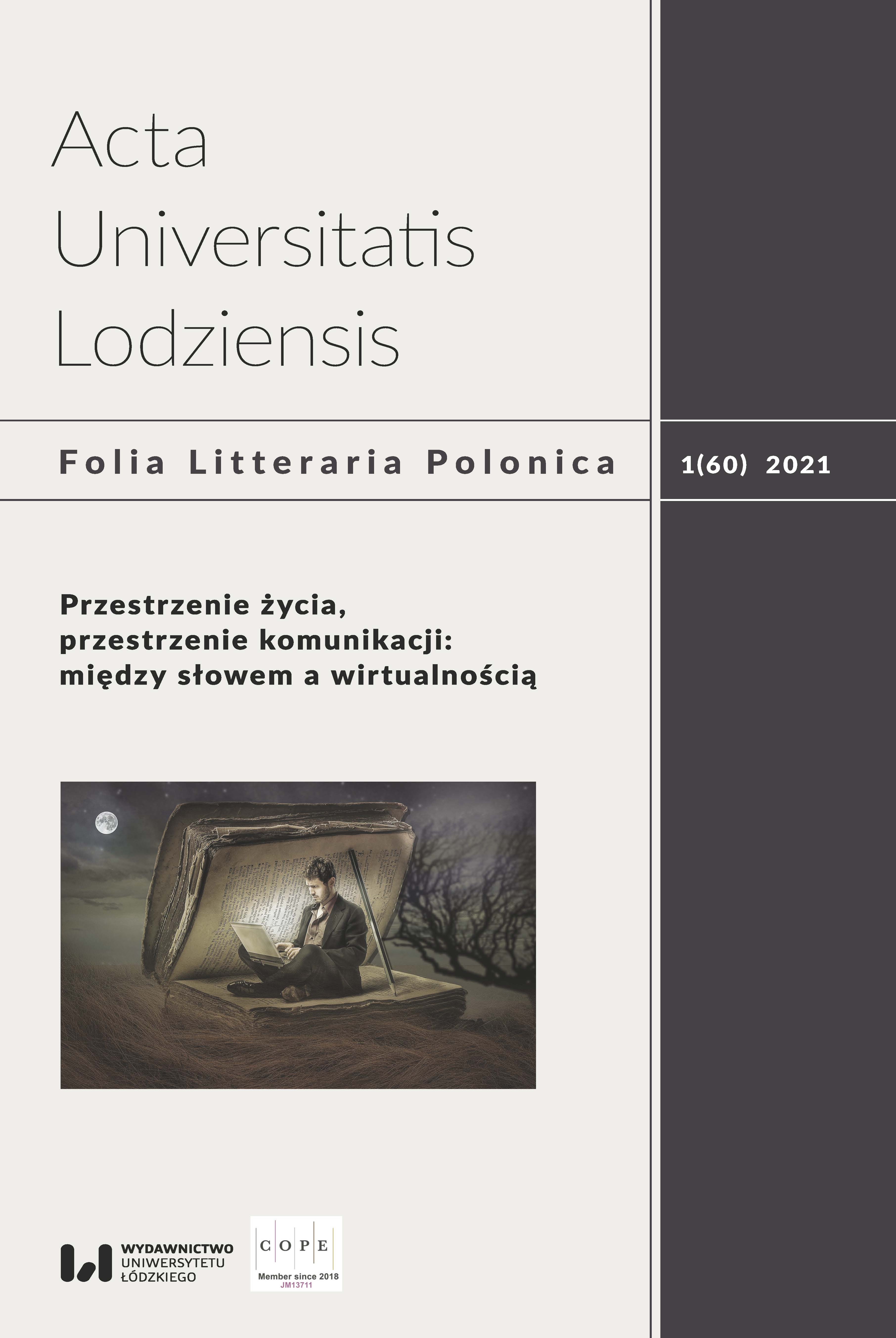The importance of practice for the digital culture researcher
DOI:
https://doi.org/10.18778/1505-9057.60.05Keywords:
humanities, science, third culture, medialabAbstract
The article discusses the importance of practice for conducting research on digital culture. It poses questions about whether one should possess technical competences in the field of digital humanities and in what way they can facilitate research attempting to describe the contemporary world. This issue is analysed using the theory of the third culture developed by Charles Percy Snow. The argument also focuses on other researchers representing various strategies for combining practice with theory, such as: Lev Manovich, Alexander R. Galloway, Jan Stasieńko and Mirosław Filiciak. The aim of the article is to describe the emerging, new image of a humanist studying digital culture, whose new competence may be seen as a remedy for the ongoing crisis of the humanities.
Downloads
References
Braidotti Rosi, Po człowieku, przeł. Joanna Bednarek, Aleksander Kowalczyk, Wydawnictwo Naukowe PWN , Warszawa 2014.
Google Scholar
Drenda Olga, Kuratorzy są bezradni wobec C++ (wywiad z Pawłem Janickim), http://www.dwutygodnik.com/artykul/5909-kuratorzy-sa-bezradni-wobec-c.html [dostęp: 11.09.2018].
Google Scholar
Drygalska Ewa, Marjanowska Anna, Software studies – co to takiego? (wywiad z Janem Argasińskim), http://www.miesiecznik.znak.com.pl/software-studies-co-to-takiego/ [dostęp: 11.09.2018].
Google Scholar
Filiciak Mirosław, Zajrzeć pod powierzchnię ekranu, „Kultura Popularna” 2008, nr 4 (22), s. 15–18.
Google Scholar
Filiciak Mirosław, Tarkowski Alek, Medialab – instrukcja obsługi, w: Medialab. Instrukcja obsługi, red. Mirosław Filiciak, Alek Tarkowski, Agata Jałosińska, Fundacja Ortus, Chrzcielice 2011.
Google Scholar
Fuller Matthew, How to be a Geek, Polity Press, Cambridge, Mass. 2017.
Google Scholar
Halawa Mateusz, Ręce ubrudzone kodem (wywiad z Alexandrem R. Gallowayem), „Kultura popularna” 2008, nr 4 (22), s. 19–22.
Google Scholar
Internet, media, kulturoznawstwo, pasja (wywiad z Mirosławem Filiciakiem), https://www.swps.pl/miroslaw-filiciak [dostęp: 11.09.2018].
Google Scholar
Kittler Friedrich, Technologies of Writing/Rewriting Technology, „New Literary History” 1996, nr 27 (4), s. 731–742.
Google Scholar
DOI: https://doi.org/10.1353/nlh.1996.0049
LEM w Collegium Maius, http://zycie.amu.edu.pl/nauka/lem-w-collegium-maius [dostęp: 11.09.2018].
Google Scholar
Manovich Lev, Język nowych mediów, przeł. Piotr Cypryański, Wydawnictwa Akademickie i Profesjonalne, Warszawa 2001.
Google Scholar
Manovich Lev, Software Takes Command, Bloomsbury, New York 2013.
Google Scholar
DOI: https://doi.org/10.5040/9781472544988
Medialab Chrzcielice – obóz Kultury 2.0, https://www.dwutygodnik.com/artykul/1465-medialab-chrzelice--oboz-kultury-20.html [dostęp: 11.09.2018].
Google Scholar
Nacher Anna, Cyfrowa humanistyka. Na styku sztuki, nauki i technologii, „Czas Kultury” 2015, nr 2, s. 20–26.
Google Scholar
Robot Sophia otrzymuje obywatelstwo Arabii Saudyjskiej, https://www.wirtualnemedia.pl/artykul/robot-sophia-otrzymuje-obywatelstwo-arabii-saudyjskiej [dostęp: 11.09.2018].
Google Scholar
Składanek Marcin, Meta-design. Strategie, narzędzia i wspólnoty kreatywne na przykładzie Processing, w: Kody McLuhana. Topografia nowych mediów, red. Anna Maj, Michał Derda-Nowakowski, Wydawnictwo Naukowe ExMachina, Katowice 2009, s. 251–264.
Google Scholar
Składanek Marcin, Sztuka generatywna – obrazy kodu. Kilka przybliżeń, w: Trajektorie obrazów. Strategie wizualne w sztuce współczesnej, red. Ryszard Waldemar Kluszczyński, Dagmara Rode, Wydawnictwo Uniwersytetu Łódzkiego, Łódź 2015, s. 55–68.
Google Scholar
Słodownik Agnieszka, Medialab w Lublinie, https://www.dwutygodnik.com/artykul/2699-medialab-w-lublinie.html [dostęp: 19.09.2018].
Google Scholar
Snow Charles Percy, Dwie kultury, przeł. Tadeusz Baszniak, Pruszyński i S-ka, Warszawa 1999.
Google Scholar
Software Studies. A lexicon, red. Matthew Fuller, MIT Press, Cambridge, Mass. 2008.
Google Scholar
Szczeklik Andrzej, Dwie kultury, „PAUza Akademicka” 2009, nr 55, s. 1.
Google Scholar
Szota Michał, Magiczna sztuka programowania komputerów, „Kultura Popularna” 2008, nr 4 (22), s. 37–40.
Google Scholar
W stronę trzeciej kultury. Koegzystencja sztuki, nauki i technologii, red. Ryszard Waldemar Kluszczyński, Centrum Sztuki Współczesnej Łaźnia, Gdańsk 2016.
Google Scholar
Whitmore Paul, Soft skills. Definition, behavioral model analysis, training procedures, National Technical Information Service, Springfield 1974.
Google Scholar
Downloads
Published
How to Cite
Issue
Section
License

This work is licensed under a Creative Commons Attribution-NonCommercial-NoDerivatives 4.0 International License.











